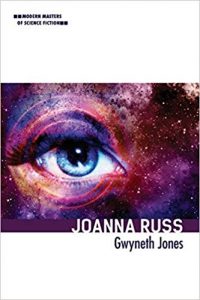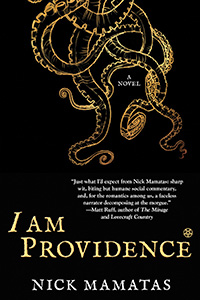Russell Letson Reviews Joanna Russ by Gwyneth Jones
 Joanna Russ, Gwyneth Jones (University of Illinois Press 978-0-252-08447-8, $22.00, 224pp, tp; 978-0-252-04263-8, $99.00, 224pp, hc). September 2019.
Joanna Russ, Gwyneth Jones (University of Illinois Press 978-0-252-08447-8, $22.00, 224pp, tp; 978-0-252-04263-8, $99.00, 224pp, hc). September 2019.
Gwyneth Jones’s Joanna Russ, part of the University of Illinois Modern Masters of Science Fiction series (edited by Gary K. Wolfe, of this parish), also had me looking back at my reading history. For some reason, I have always thought of Russ, who died in 2011, as a contemporary, even though she was born eight years before me and had her Yale MFA in hand when I was only halfway through high school. Perhaps it was because she was engaging some of the gender-political issues I was starting to notice in the 1960s, thanks in part to my reading of George Bernard Shaw, Theodore Sturgeon, Betty Friedan, and (yes) Heinlein. I particularly enjoyed her book reviews in F&SF, and I sought out the two Ace Science Fiction Special novels, Picnic on Paradise and And Chaos Died. So when The Female Man appeared in 1975, I was prepared for its feminist thematics, though the intensity of the book did require some facing-up-to.
But her 1940s-50s upbringing and background were certainly very different from mine (her, New York City Jewish girl; me, small-town Catholic boy), trailing along nearly a decade behind. Jones describes the tensions within Russ’s family and the casual, reflexive sexism of the academic and professional worlds she entered in the late 1950s. As a result, she writes, Russ experienced the “female adolescent drama of disillusion [that] was unfolding all over America,” and she became “one of those who spoke for a generation of angry young women, enfranchised but far from emancipated.” She also became an accomplished writer of fiction, reviews, and essays, and an early, distinctive, and assertive feminist voice in science fiction.
The armature of the monograph is a career overview with a strong biographical element, intertwining the life and the work, and a particular strength is that it covers the whole range of Russ’s output, including the book reviews and the literary-critical and feminist-theoretical work along with the fiction. Jones’s extensively annotated summaries of the novels and stories cross-connect with each other, with elements of Russ’s biography (“Joanna’s fiction always, deliberately, drew on autobiography”), and with a pair of interviews appended at the end: one with Russ, from 1975, and one with critic/editor Kathryn Cramer, who studied with Russ as an undergraduate. The result is a detailed and sympathetic whole-person portrait of a writer whose first response to anything was to write about it, in whatever mode would do the job.
For me, the centerpieces are a detailed, chapter-length look at The Female Man that unpicks the strands of that braided narrative and connects it to Russ’s reviews, essays, and related short fiction of the same period; and an account of the multi-writer Symposium: Women in Science Fiction that was first published in the fanzine Khatru in 1975. The novel is structurally and emotionally complex, simultaneously dead-serious and angry and ironic, driven by both popular/genre and “literary” machineries – SF tropes (however inverted or subverted) and modernist or (to use Jones’s term) “post-realist” techniques – that take the reader through a challenging set of questions and recognitions. The Khatru Symposium (chapter title: “The Secret Feminist Cabal”), conducted before The Female Man appeared (it had been completed by 1971), shows Russ in conversation and occasionally collision with nine other writers and literary workers, including Le Guin, Delany, Suzy McKee Charnas, Vonda McIntyre, Kate Wilhelm, and a not-yet-outed James Tiptree, Jr. Jones calls this exchange of views “rambunctious [and] energizing” but also, “ironically, the high point of Russ’s engagement with SF feminism…. The role of ‘first among equals’ had become a back-breaking responsibility.”
Russ also wrote a number of very useful critical articles – her essays in College English, Extrapolation, and Science Fiction Studies in particular helped me to think about SF as SF and as “literature” – that is, to make room for genre work in the space called Art. Her love of SF/F in all its tawdry glory, of Star Trek fan fiction, and of the modernism represented by the work of her teacher Vladimir Nabokov and his end of the literary world made for a unifying vision. In fact, despite her long-time interest in political/social issues, it seems to me that Russ’s center was strongly “literary” or aesthetic – or, at least, she did not push art aside to make room for politics. Instead, art seems to have been the way she engaged politics – Kathryn Cramer notes that Russ got “fed up” with one “socialist/communist” women’s organization because they thought “her writing fiction instead of political essays was counterrevolutionary and a capitulation to capitalism.”
In reading this account, I was struck again by the volume of Russ’s work, and how active and agile and endlessly engaged she was across its considerable range. Jones makes extensive use of the scholarship on Russ and literary feminism, and backtracking through her secondary-sources bibliography would provide a seminar’s worth of reading. This overview would be a particularly good introduction for undergraduates (or any interested reader) looking for a way into Russ’s career and into the gender-in-SF issues of her time. She was smart, angry, observant, demanding, funny, eloquent, and compulsively readable in any of her modes.
Russell Letson, Contributing Editor, is a not-quite-retired freelance writer living in St. Cloud, Minnesota. He has been loitering around the SF world since childhood and been writing about it since his long-ago grad school days. In between, he published a good bit of business-technology and music journalism. He is still working on a book about Hawaiian slack key guitar.
This review and more like it in the November 2019 issue of Locus.
 While you are here, please take a moment to support Locus with a one-time or recurring donation. We rely on reader donations to keep the magazine and site going, and would like to keep the site paywall free, but WE NEED YOUR FINANCIAL SUPPORT to continue quality coverage of the science fiction and fantasy field.
While you are here, please take a moment to support Locus with a one-time or recurring donation. We rely on reader donations to keep the magazine and site going, and would like to keep the site paywall free, but WE NEED YOUR FINANCIAL SUPPORT to continue quality coverage of the science fiction and fantasy field.








